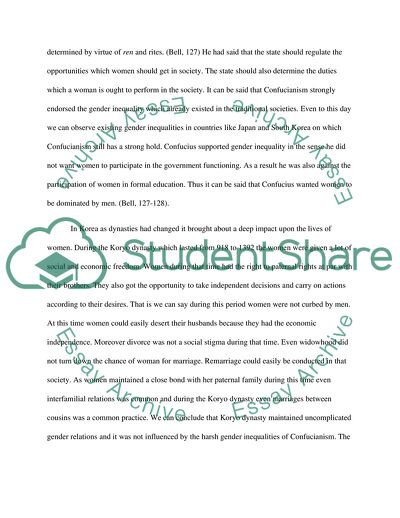
- Home
- Free Samples
- Premium Essays
- Editing Services
- Extra Tools
- Essay Writing Help
- About Us
- Studentshare
- Subjects
- Miscellaneous
- Woman and confucianism in history of Korea
Woman and confucianism in history of Korea - Essay Example

- Subject: Miscellaneous
- Type: Essay
- Level: Ph.D.
- Pages: 4 (1000 words)
- Downloads: 0
- Author: altenwerthmagno
Extract of sample "Woman and confucianism in history of Korea"
(Deuchler, 14). In fact Korea traditionally prided in being more strictly adhered to Confucianism than China, the homeland of Confucianism. Korean scholarship is highly indebted to the orthodox cultivation of Confucianism. In China Confucianism had combined the elements of Buddhism and Daoism but in Korea the attitude of Confucianism towards Buddhism was harsher and more exclusive in nature. (Yao, 122). The aim of the paper is to find out the effects which Confucianism had on women of the Korean society.
According to Confucianism there are no citizens in a society. Only subjects and rulers are present in a society. Taking cue from such an assumption we can easily find out what duties and roles did Confucianism assign women. Women, according to Confucianism were subjects in the society. The status of women according to the tenets of Confucianism was discussed mostly as relation between husbands and wives. Confucianism was of the opinion that the relation between husband and wife was one of the most important relationships existing in the society and is determined by virtue of ren and rites.
(Bell, 127) He had said that the state should regulate the opportunities which women should get in society. The state should also determine the duties which a woman is ought to perform in the society. It can be said that Confucianism strongly endorsed the gender inequality which already existed in the traditional societies. Even to this day we can observe existing gender inequalities in countries like Japan and South Korea on which Confucianism still has a strong hold. Confucius supported gender inequality in the sense he did not want women to participate in the government functioning.
As a result he was also against the participation of women in formal education. Thus it can be said that Confucius wanted women to be dominated by men. (Bell, 127-128). In
...Download file to see next pages Read MoreCHECK THESE SAMPLES OF Woman and confucianism in history of Korea
Confucian Influence on Korean Society
History and Rituals of Korean Shamanism
Gender Bias in Korea and Japan
Spread and Adaptation of Neo-Confucianism in East Asia
Korean Protestants Dealing with Ancestor Worship
What Was Northern Learning and Why Did Some Korean Scholars Advocate It
Confucianism and Feminism: Women on Screen from the Late 1990s in South Korea
Confucian Influence to Korean Society: Social Structures and Women's Status in Yi Dynasty

- TERMS & CONDITIONS
- PRIVACY POLICY
- COOKIES POLICY